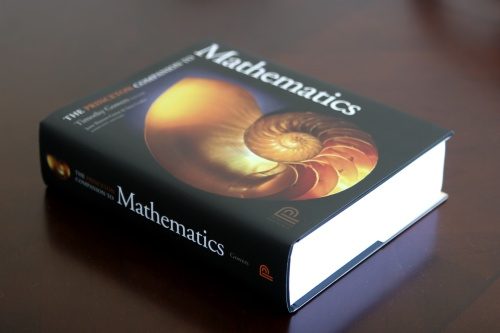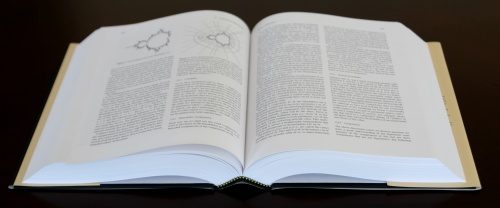I recently got a hold of what I consider to be the nicest mathematical book in my collection. As a matter of fact, it’s the nicest book I own, period – even though I posses bookshelves teaming with terrific titles on mathematics, science, programming, computer science, photography and so on. The book I’m talking about is The Princeton Companion to Mathematics. If you are in an absolute rush, the short version of my post today is, buy this title. You don’t have to click on the link with my referral if you don’t want to, seriously just pick up a copy of this book, I can guarantee you that it will be love at first sight.


I’d like to claim that I’ve read it cover to cover. But I haven’t. At 1014 pages (and a hefty five and a half pounds), this recently published hardcover tome will probably take me a while to properly read through in its entirety. It can serve as a reference that can be randomly accessed if you so chose, but from what I’ve read so far, I’m extremely impressed and am eager to pursue my way through it systematically. It will be time really well spent, and dare I say, a life changing experience. This is the book to bring on a proverbial desert island, if you were allowed only one title.
The Princeton Companion to Mathematics is not only a beautiful book from an aesthetic standpoint, with its heavy, high quality pages and sturdy binding, but above all it’s a monumental piece of work. I have never seen a book like this before. It rigorously illustrates the (pure) mathematical field while remaining as accessible as possible to the general reader. There is no mathematician in the world who, upon reading this book cover to cover, would not have learned a great deal from it. And I’m sure this includes Timothy Gowers himself, who was the book’s Chief Editor and who brilliantly managed to coordinate a team of world class experts to cover (again in an accessible manner) their respective fields of expertise. Such experts not only are the best mathematicians alive today in their respective areas of expertise, but are also absolutely wonderful teachers who have the uncanny ability to divulge information in a understandable manner, under the editorial guidance of Professor Gowers. Timothy Gowers, by the way, also has a blog, which contains discussions about the book and a helpful errata.
This book is what I now consider to be the bible of mathematics, and unlike a typical reference or encyclopedia, The Princeton Companion to Mathematics never fails to provide a sense of unity and cohesion, both of which are essential if you want to truly provide an (nearly) complete panorama of a subject. While all the basics are well explained with the clarity and simplicity of really good popular science, this tome doesn’t skimp on details or theorems when it comes to highly advanced topics that few people are familiar with. The style remains geared towards providing a good introduction to each subject, as opposed to a PhD thesis, and as such it will prove useful to the ambitious high school student, as well as professional mathematicians or graduate students. And as if all this wasn’t enough, they managed to squeeze in a biographical overview of the most important historical mathematicians from Pythagoras to Bourbaki, as well as a respectable (yet not overly comprehensive section) about applied mathematics, and math’s influence on other disciplines.
I believe this is the kind of book that will still be is use a hundred years from now, even though by then it will be slightly outdated. This title is destined to be fully revered as a classic and monumental review of the subject of pure mathematics. I salivate like Pavlov’s dogs at the idea of the amount of fun I will have exploring this book, which will no doubt expose my ignorance about several key areas of math, and yet at the same time help me to remedy such things.
This Christmas, give yourself a great gift and get this book. If you are looking for the perfect gift for people who’re interested in mathematics, this is the right book. If you are a parent, I especially encourage you to pick it up for your son or daughter, it could change their lives. Ladies, your geeky boyfriend will likely propose to you if you put a copy under the tree. Jokes aside, The Princeton Companion to Mathematics makes for a great read to start 2009 off with.

Just I’m wondering if this book should be in my personal library. Thanks for the review. 🙂
Thanks, Antonio – nice post – the book looks interesting. I like books like that – which are worth reading more than once …
– Vasudev
Hey Antonio, Thanks for creating more awareness of this book – I just reviewed it over at Amazon and had a peak inside it there… I think I’m going to have to get this book. I’ve been looking for a while now for a book that is essentially what this is: a complete overview of pure mathematics. I thought Mathematics for the Non-Mathematician was an attempt at this, but it’s so outdated, even though the subject of math tends to not change very drastically. But I was also looking for a great presentation of this information and this book you note seems to have this.
Thanks!
I would suggest “A Certain Ambiguity”
Would have been finer had the author mentioned some examples. Otherwise the post looks like a paid advt for the book with all blind descriptions.
@Arul: I wish somebody paid me to read Math books. 🙂 I will take your advice though, and show a few examples in future posts.
I am getting ready to start a Master degree in Applied Statistics and one of the prerequisites is two quarters of college level calculus…I took that about 15 years ago so I need to brush up.
Can you recommend a text book that would give me the proper foundation…not too difficult one, I might ask 🙂
MarkformCt, one of the easiest Calculus books out there is The Calculus Lifesaver. If you are a Math major or very ambitious, here I reviewed a few “more traditional” Calculus books. I consider these books to be the best, but are far from the easiest.
Thanks for the reco. I used your link to order the Lifesaver through amazon.
Thanks Mark. I appreciate that.
i am buying this book now 🙂
Hello! That sounds like a great book. I’m also wondering if you would like to recommend a book that has lots of proofs for basic and not-so-basic mathematics. I’m preparing for some upper level math major undergrad courses, and I’m deficient in proofs. Maybe this Princeton book is it, or any other ideas?
Thanks!
What about the CRC Mathematical Tables and Formulae that’s my choice for a universal math reference.
I just ordered it online. I can’t believe you convinced a poor unemployed student to spend that kind of money. I hate you a little.
But, seriously, thanks for the recommendation. I’m sure it will provide countless hours of entertainment and a few moments of enlightenment too.
Su, you are going to love every page of it. 🙂
I want to learn modern math, so I want this book.
There is another helpful book, the Oxford User’s Guide to Mathematics, which is more limited in scope but has many subjects covered deeper than the PCM. For more details see my recent post.
Hey, can someone please give me an idea of what sort of background one should have before trying to get through this book? I have been looking for a book like this for a long time (am also considering the book “what is mathematics”), and I want to make sure that I don’t start to go through it, and then realize that I require a doctorate in mathematics first!
My math background is not extensive – university level calculus, some linear algebra, and very little geometry.
Any comments about what one should know before starting this book would be very much appreciated!
Josh, your math background should be sufficient to read this book. You’ll learn plenty from it, but other books will be needed if you wish to go more in depth on specific subjects. Read my recommend math books page for guidance.
Definitely The Math Book by Clifford Pickover. The stories and pictures are so great and give you just enough information to go ahead and do more research on the many topics on your own.
thanks for the post, the book look nice and very interesting 😀